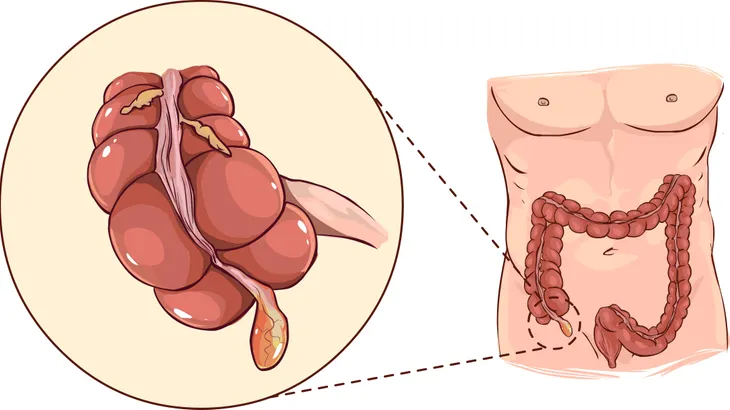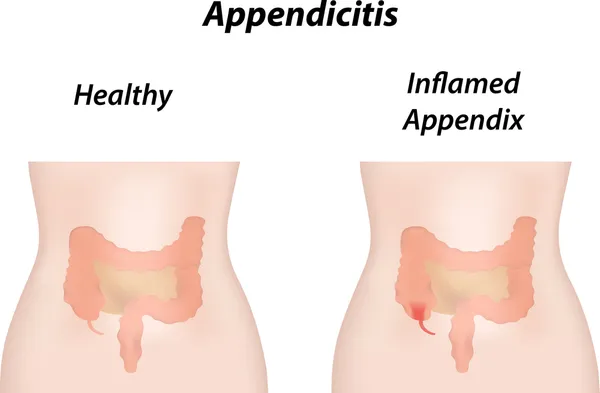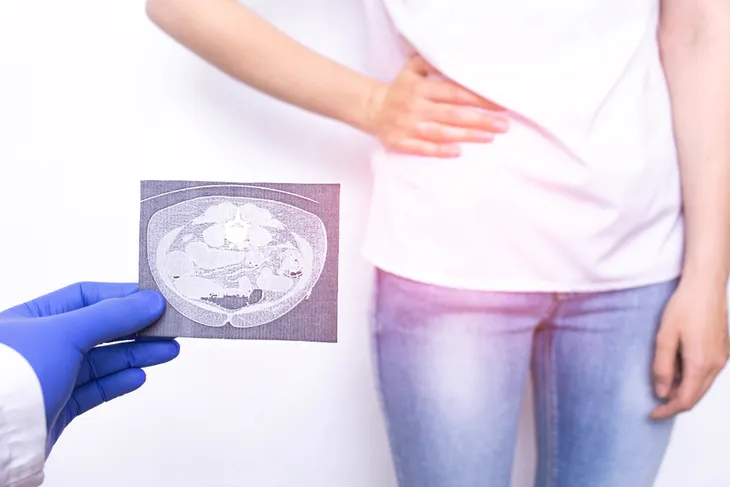Appendicitis occurs when the appendix becomes inflamed. Roughly 5-percent of Americans will experience it at some point in their lives. It can also be acute or chronic.
If appendicitis is left untreated it can cause your appendix to burst. When this happens, bacteria can spill into your abdominal cavity. If this occurs, you must seek emergency care right away as it can be very serious and in some cases, even fatal. To help you recognize if you’re experiencing appendicitis, here’s everything you should know including the common symptoms, causes, and treatment options.
Acute Appendicitis vs. Chronic Appendicitis
Chronic and acute appendicitis will have similar symptoms but there are some key differences worth noting. An individual with acute appendicitis will develop sudden and severe symptoms, usually over a 24 to 48-hour period. The symptoms are so severe you can’t ignore them and they require immediate emergency attention.
Chronic appendicitis, on the other hand, entails symptoms that last for a long time and usually come and go. “If chronic appendicitis is not diagnosed, the person can continue to experience symptoms for years,” says Medical News Today.
Recurring pain in your lower abdomen can be a symptom of many underlying conditions. So, it’s important you talk to your doctor to determine the cause.
Common Signs and Symptoms of Appendicitis
At first, appendicitis may begin as mild cramping in your abdomen. As time progresses, your symptoms typically become more steady and severe. It’s also common for the pain to start near your belly button or upper abdomen before moving to the lower right quadrant of your abdomen.
Telltale signs of appendicitis include pain in the lower right quadrant of your abdomen, loss of appetite, nausea, vomiting, diarrhea, and constipation. Sufferers may also experience a low-grade fever, abdominal swelling, and an inability to pass gas.
Healthline says, if you’re constipated and you think you may have appendicitis, it’s important that you avoid taking laxatives or using an enema as these treatments may cause the appendix to burst.
Less Common Symptoms
There are also less common symptoms of Appendicitis that can occur and are worth noting. WebMD notes, a “dull or sharp pain anywhere in your upper or lower belly, back, or rear end,” may occur. Painful urination or having difficulty going to the bathroom is also less common but can still be a sign of appendicitis.
The source also notes vomiting before the abdominal pain begins is also possible. Finally, severe cramps and diarrhea with gas are also possible symptoms.
Signs of Appendicitis in Children
Appendicitis most commonly affects individuals between the ages of 15 and 30. However, It can develop at any age, including children. In fact, Healthline says it’s estimated 70,000 children experience appendicitis annually in the U.S.
Signs your child may have appendicitis are loss of appetite, fever, nausea, and vomiting. If your child develops these symptoms contact your doctor right away.
When to See a Doctor
If you develop pain or tenderness in the right side of your abdomen and if you experience any of the other common symptoms of appendicitis, see a doctor right away. WebMD notes, “timely diagnosis and treatment are important.”
Leaving appendicitis untreated can lead to even more serious complications. It’s also recommended that you avoid eating, and drinking if you suspect you have appendicitis. You should also avoid using any pain remedies, antacids, laxatives, or heating pads, and instead get to a doctor right away.
What Causes Appendicitis?
So, what causes appendicitis in the first place? Healthline points out the exact cause of appendicitis is often unknown. However, experts believe it occurs when part of the appendix becomes blocked.
Several things can cause the blockage such as a buildup of hardened stool or enlarged lymphoid follicles. The source also notes tumors, a traumatic injury, and intestinal worms can also potentially block the appendix.
How Is Appendicitis Diagnosed?
If your doctor thinks you may have appendicitis they will first start with a physical exam. During the exam, they will look for tenderness, swelling, or rigidity in the lower right quadrant of your abdomen. They may also request a blood test to check for infection.
Further, Cleveland Clinic explains your doctor may request a variety of imaging tests to look for signs of blockage, inflammation, or organ rupture. These tests include computed tomography (CT) scans, magnetic resonance imaging (MRI), and ultrasounds.
Complications
Getting medical help is crucial because leaving appendicitis untreated can cause serious complications. If left untreated, an inflamed appendix will burst. This is dangerous because it can spill bacteria and debris into the abdominal cavity and lead to “peritonitis, a serious inflammation of the abdominal cavity’s lining,” says WebMD.
Without treatment, it can be fatal which is why it’s imperative that you seek medical help right away if you suspect you have appendicitis.
Treating Appendicitis
Your treatment plan will depend on your condition. That said, common treatment options for appendicitis include surgery to remove the appendix, surgery to drain an abscess, and antibiotics. Pain relievers, IV fluids, and a liquid diet is also common.
While it is rare, appendicitis may improve without surgery. But in most cases, surgery to remove the appendix is necessary. Let’s take a closer look at what surgery entails next.
Surgery
Surgery is the most common form of treatment for appendicitis. This surgery is known as appendectomy. However, if your appendix has burst, your surgeon will likely need to clean out your abdominal cavity too.
Some cases require open surgery to remove the appendix while others may get laparoscopy which is a minimally invasive surgery. All surgeries pose some risks but the Healthline points out that, “the risks of appendectomy are smaller than the risks of untreated appendicitis.”
What You Need to Know About Recovery
How you recover from appendicitis will depend on a few factors from your overall health to the type of treatments you receive. For example, if you have a laparoscopic appendectomy you may be discharged from the hospital a few hours after surgery. But if you have open surgery you may require a hospital stay for a few days to recover.
It can take a few weeks to fully recover from appendicitis and surgery but the good news is your healthcare team will provide you with all the information you need to recover. For starters, they will teach you how to care for your incision sites and they may prescribe antibiotics to prevent infection, and pain relievers to help with the pain. They may also recommend lifestyle adjustments while you recover.
Prevention
Unfortunately, there is no way to prevent appendicitis. However, “it may be less common in people who eat foods high in fiber,” says WebMD. Experts aren’t completely sure why but it’s certainly worth adding more fiber in your diet if not for preventing appendicitis, then for your bowel health.
According to the Academy of Nutrition & Dietetics, every person should try to get about 38-grams of fiber each day. Luckily there are many high fiber foods to choose from such as whole grains, fresh fruits, and vegetables, and more.















